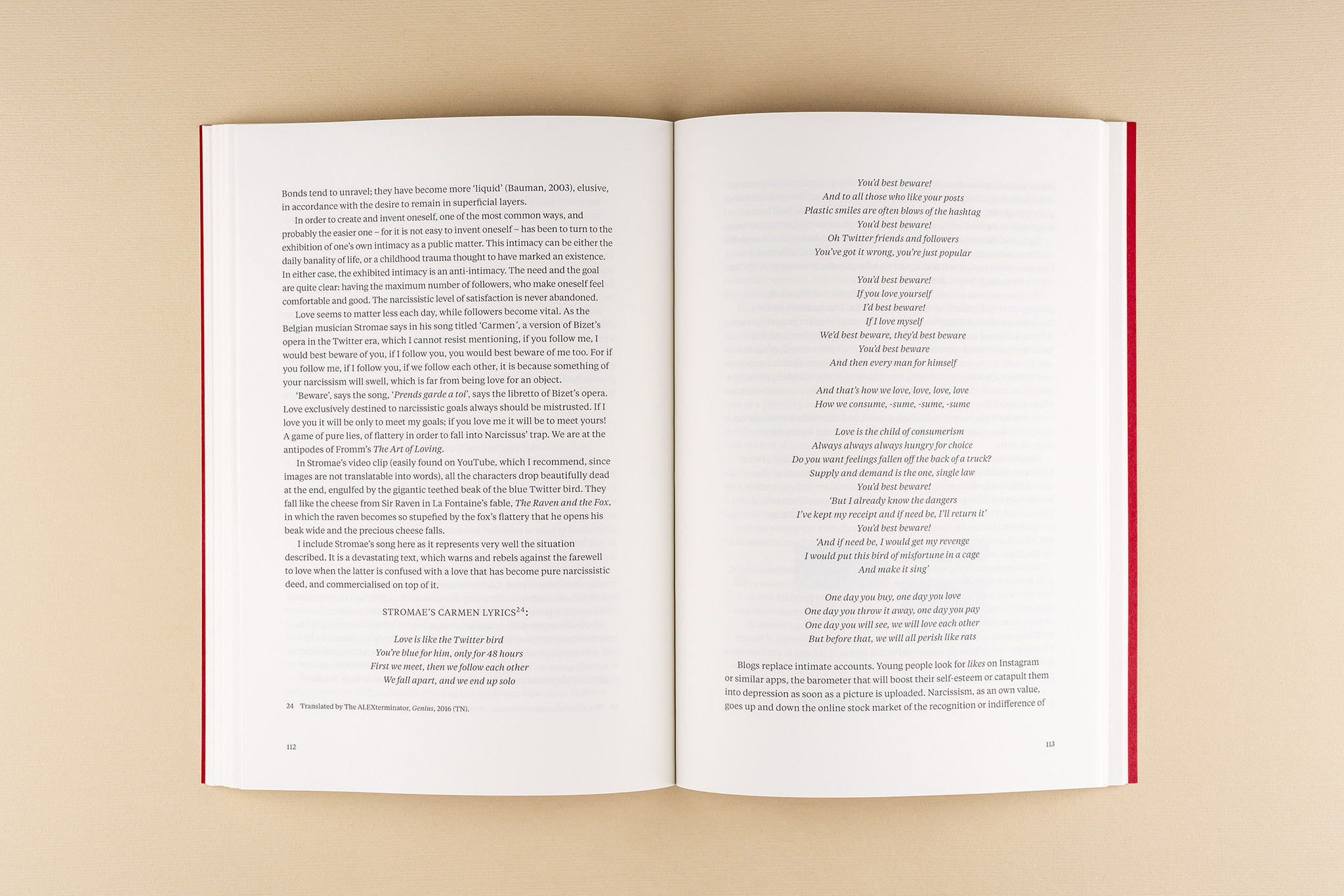Do You L@ve Me or Do You Follow Me?
This book has been written by a psychoanalyst for psychoanalysts, but it is also intended for a wider public interested in psychoanalysis today and how it is affected by the Internet and digital culture.
Martina Burdet’s hypothesis is that, at the beginning of the 21 century, we are facing a new love order in which the other in the contact has been turned into someone without characteristics: banal, replaceable, interchangeable, disposable – creating a situation in which the connection replaces the relationship. She explores this hypothesis in detail, both through scientific research and through the stories of her patients, who describe their difficulties in finding and feeling love in the time of the Internet.
She examines a world where the body has become absent, in which temporariness is marked by an eternal presentism, looking at a new type of arousal that blows apart the traditional harmony between love and sex, and exploring the traumatic aspects of living in an environment that is overwhelmed by arousal – from the proliferation of pornography to the new phenomena of self-exhibition in the media and on the internet in search for recognition. Today’s amount of sexual offers, she suggests, of blunt online proposals, as well as the recent free access to porn implies that love, the other of love, who until recently was called partner, empties itself of meaning. When the goal is increasingly just a sexual tension discharge, the ‘amorous’ or ‘love’ choice – the object of the overexcitement discharge, becomes irrelevant.
The Internet, she posits, is increasingly used for narcissistic purposes. Contacting others enables oneself to feel in company, which can soothe, excite, depress, console, make oneself feel important or a nobody. Having followers in networks and obtaining ‘likes’ serves a successful or failed mirrored narcissistic function. Knowing that oneself is followed, watched, no matter where (Instagram, Facebook, Twitter, publication pages, reality shows), becomes the motor of existence. In addition, the availability of 24/7 networks is contributing to many cases of people who are incapable of elaborating loss and separation, as instead they find on the internet immediate substitutes for this loss, with an antidepressant function. It is as nothing has been lost, as if one human being can repair the loss of another because one equates another: just like merchandise. This seems to be connected to the current social imperative to enjoy oneself – without limits – carpe diem.
All this may give the illusion of a substitute contribution. On one level, it leads to an enhanced capacity for self-procreation, this is the era of self-help. But is it self-help or a desperate cry for help? This book questions the notion of the limits between normalcy and pathology. Martina Burdet suggests that, for an increasing number of people, the staring at the screen, the notification of likes, becomes as vital as the gaze of the first object mother, and equally dramatic in the case of its disappearance. In this sense, the new Internet era fosters not only a self-help culture but also a sense of drowning. There is no success nor celebrity that are not public, and when it is failure that is public, it is gigantic and leads to sinking.
The problem, she concludes, is that absent on the date is a differentiated other, desired and loved for their difference and complexity, for their own qualities. In its place emerges various forms of elections of doubles, of self-worship, of exhibitionism. The follower is an anonymous follower with a rising value in a world where what matters is to be seen, to be followed and to be connected. In this world, both the subject as much as the object, stripped of what makes them individual, risk becoming simply data.
In summary, the love that is explored here, in its dialogue with the Internet and the media, is a place where one escapes from the other, because of combined early and environmental traumas, looking for tools that momentarily soothe but which actually increase the problem. The healing response that comes from being able to be thought by another psyche does not exist in these circumstances and so the psychoanalytic contribution represents a privileged tool, both in order to understand and help a psyche submerged in a very particular reality.
‘The reader will soon discover that they have in their hands lies an original and timely book: two rare and indisputably engaging characteristics. The topicality of the subject matter is evident in the title: Love in the Time of the Internet. This book’s originality stems not only from the subject under discussion – generally neglected by psychoanalysts – but also from its method, which involves a detailed, in-depth study of the problem and its implications through what the author refers to as ‘Ordinary Stories’; that is, clinical vignettes: stories of patients who describe how they can – or actually, how they cannot – love in the time of the Internet.’
Jorge Canestri, President of the European Psychoanalytical Federation
Buy the Book
The purchase price is € 35 with taxes included
The shipping cost is € 3 for destinations within the European Union (EU) and € 9 for other destinations.
You can make the secure purchase through Paypal by accessing one of the following links. Thanks a lot.
Purchase Book for EU Purchase Book for non EU Purchase Book in Amazon



